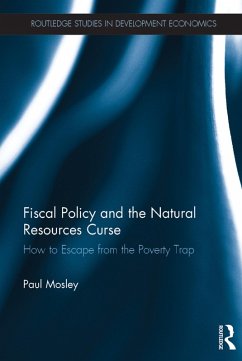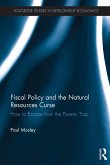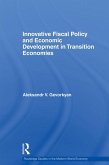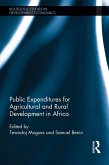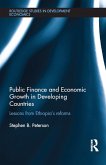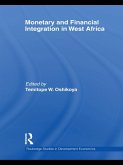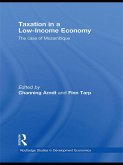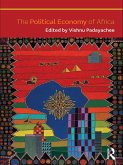Paul Mosley
Fiscal Policy and the Natural Resources Curse (eBook, PDF)
How to Escape from the Poverty Trap
45,95 €
45,95 €
inkl. MwSt.
Sofort per Download lieferbar

23 °P sammeln
45,95 €
Als Download kaufen

45,95 €
inkl. MwSt.
Sofort per Download lieferbar

23 °P sammeln
Jetzt verschenken
Alle Infos zum eBook verschenken
45,95 €
inkl. MwSt.
Sofort per Download lieferbar
Alle Infos zum eBook verschenken

23 °P sammeln
Paul Mosley
Fiscal Policy and the Natural Resources Curse (eBook, PDF)
How to Escape from the Poverty Trap
- Format: PDF
- Merkliste
- Auf die Merkliste
- Bewerten Bewerten
- Teilen
- Produkt teilen
- Produkterinnerung
- Produkterinnerung

Bitte loggen Sie sich zunächst in Ihr Kundenkonto ein oder registrieren Sie sich bei
bücher.de, um das eBook-Abo tolino select nutzen zu können.
Hier können Sie sich einloggen
Hier können Sie sich einloggen
Sie sind bereits eingeloggt. Klicken Sie auf 2. tolino select Abo, um fortzufahren.

Bitte loggen Sie sich zunächst in Ihr Kundenkonto ein oder registrieren Sie sich bei bücher.de, um das eBook-Abo tolino select nutzen zu können.
Fiscal Policy and the Natural Resources Curse ask why many governments of natural resource-intensive countries are incapable, in a globalised world, of dealing with the natural-resource curse. This book offers a detailed analysis of the power-relationships which underpin the natural resource curse, using both statistical analysis and country case-studies from Africa and Latin America to pinpoint the strategies that have enable developing countries to break out of the poverty trap.
- Geräte: PC
- mit Kopierschutz
- eBook Hilfe
- Größe: 2.18MB
Andere Kunden interessierten sich auch für
![Fiscal Policy and the Natural Resources Curse (eBook, ePUB) Fiscal Policy and the Natural Resources Curse (eBook, ePUB)]() Paul MosleyFiscal Policy and the Natural Resources Curse (eBook, ePUB)45,95 €
Paul MosleyFiscal Policy and the Natural Resources Curse (eBook, ePUB)45,95 €![Innovative Fiscal Policy and Economic Development in Transition Economies (eBook, PDF) Innovative Fiscal Policy and Economic Development in Transition Economies (eBook, PDF)]() Aleksandr GevorkyanInnovative Fiscal Policy and Economic Development in Transition Economies (eBook, PDF)45,95 €
Aleksandr GevorkyanInnovative Fiscal Policy and Economic Development in Transition Economies (eBook, PDF)45,95 €![Public Expenditures for Agricultural and Rural Development in Africa (eBook, PDF) Public Expenditures for Agricultural and Rural Development in Africa (eBook, PDF)]() Public Expenditures for Agricultural and Rural Development in Africa (eBook, PDF)51,95 €
Public Expenditures for Agricultural and Rural Development in Africa (eBook, PDF)51,95 €![Public Finance and Economic Growth in Developing Countries (eBook, PDF) Public Finance and Economic Growth in Developing Countries (eBook, PDF)]() Stephen PetersonPublic Finance and Economic Growth in Developing Countries (eBook, PDF)41,95 €
Stephen PetersonPublic Finance and Economic Growth in Developing Countries (eBook, PDF)41,95 €![Monetary and Financial Integration in West Africa (eBook, PDF) Monetary and Financial Integration in West Africa (eBook, PDF)]() Monetary and Financial Integration in West Africa (eBook, PDF)51,95 €
Monetary and Financial Integration in West Africa (eBook, PDF)51,95 €![Taxation in a Low-Income Economy (eBook, PDF) Taxation in a Low-Income Economy (eBook, PDF)]() Taxation in a Low-Income Economy (eBook, PDF)34,95 €
Taxation in a Low-Income Economy (eBook, PDF)34,95 €![The Political Economy of Africa (eBook, PDF) The Political Economy of Africa (eBook, PDF)]() The Political Economy of Africa (eBook, PDF)64,95 €
The Political Economy of Africa (eBook, PDF)64,95 €-
-
-
Fiscal Policy and the Natural Resources Curse ask why many governments of natural resource-intensive countries are incapable, in a globalised world, of dealing with the natural-resource curse. This book offers a detailed analysis of the power-relationships which underpin the natural resource curse, using both statistical analysis and country case-studies from Africa and Latin America to pinpoint the strategies that have enable developing countries to break out of the poverty trap.
Dieser Download kann aus rechtlichen Gründen nur mit Rechnungsadresse in A, B, BG, CY, CZ, D, DK, EW, E, FIN, F, GR, HR, H, IRL, I, LT, L, LR, M, NL, PL, P, R, S, SLO, SK ausgeliefert werden.
Produktdetails
- Produktdetails
- Verlag: Taylor & Francis eBooks
- Seitenzahl: 262
- Erscheinungstermin: 17. Februar 2017
- Englisch
- ISBN-13: 9781317370154
- Artikelnr.: 47903965
- Verlag: Taylor & Francis eBooks
- Seitenzahl: 262
- Erscheinungstermin: 17. Februar 2017
- Englisch
- ISBN-13: 9781317370154
- Artikelnr.: 47903965
- Herstellerkennzeichnung Die Herstellerinformationen sind derzeit nicht verfügbar.
Paul Mosley is a development economist with strong interests in politics and the welfare state. He has held professorial chairs at the universities of Manchester and Reading, and is currently Professor of Economics at the University of Sheffield, UK.
Contents
List of Figures
List of Tables
Preface
List of Abbreviations
1. Introduction
2. The way forward: how do 'inclusive' alliances happen?
1. Analytic framework
2. Case studies of resource-intensive countries:
i. The classic comparison: Nigeria vs. Indonesia revisited
ii. Other 'strategic alliances': Chile, Botswana, Ghana and Bolivia
iii. Other rentier-dominated states: Venezuela and Zambia
3. Summary and conclusion
3. The fiscal politics of mineral development in Ghana
1. Introduction: political settlements and their economic
consequences prior to the 1980s
2. Transformation of the tax structure: political and economic
drivers, 1981-2015
3. The politics of public expenditure allocation and poverty in Ghana
4. Mining, technical rigidity and poverty
5. Can Ghana be seen as a 'proto-developmental state'
4. Zambia: democratization without a 'social dividend'?
1. Introduction
2. The political and economic background to 2006
3. Neoliberalism challenged: the evolution of the political bargain
and of tax policy 2006-2015
4. The public finance bargain and welfare outcomes
5. Bolivia: a 'hybrid' political economy?
1. Introduction
2. The political and economic background to 2003
3. Neoliberalism challenged: the evolution of the political bargain
and of tax policy 2005-2014
4. Public expenditure, social policies and poverty
5. Politics, fiscal policy and political stability
6. Summing-up and longer-term challenges for policy
Appendix: Survey results
6. The politics of inclusive fiscal policy
1. The basic story
2. Drivers of tax revenue, competitiveness and poverty trends
3. Testing the model
4. Conclusions
7. Conclusion: How can mineral-rich countries create 'developmental
states'?
1. The politics of 'developmental states'
2. Export diversification: what distinguishes the successful cases?
3. Concluding thoughts: what can these ideas do for the poorest?
Bibliography
Index
List of Figures
List of Tables
Preface
List of Abbreviations
1. Introduction
2. The way forward: how do 'inclusive' alliances happen?
1. Analytic framework
2. Case studies of resource-intensive countries:
i. The classic comparison: Nigeria vs. Indonesia revisited
ii. Other 'strategic alliances': Chile, Botswana, Ghana and Bolivia
iii. Other rentier-dominated states: Venezuela and Zambia
3. Summary and conclusion
3. The fiscal politics of mineral development in Ghana
1. Introduction: political settlements and their economic
consequences prior to the 1980s
2. Transformation of the tax structure: political and economic
drivers, 1981-2015
3. The politics of public expenditure allocation and poverty in Ghana
4. Mining, technical rigidity and poverty
5. Can Ghana be seen as a 'proto-developmental state'
4. Zambia: democratization without a 'social dividend'?
1. Introduction
2. The political and economic background to 2006
3. Neoliberalism challenged: the evolution of the political bargain
and of tax policy 2006-2015
4. The public finance bargain and welfare outcomes
5. Bolivia: a 'hybrid' political economy?
1. Introduction
2. The political and economic background to 2003
3. Neoliberalism challenged: the evolution of the political bargain
and of tax policy 2005-2014
4. Public expenditure, social policies and poverty
5. Politics, fiscal policy and political stability
6. Summing-up and longer-term challenges for policy
Appendix: Survey results
6. The politics of inclusive fiscal policy
1. The basic story
2. Drivers of tax revenue, competitiveness and poverty trends
3. Testing the model
4. Conclusions
7. Conclusion: How can mineral-rich countries create 'developmental
states'?
1. The politics of 'developmental states'
2. Export diversification: what distinguishes the successful cases?
3. Concluding thoughts: what can these ideas do for the poorest?
Bibliography
Index
Contents
List of Figures
List of Tables
Preface
List of Abbreviations
1. Introduction
2. The way forward: how do 'inclusive' alliances happen?
1. Analytic framework
2. Case studies of resource-intensive countries:
i. The classic comparison: Nigeria vs. Indonesia revisited
ii. Other 'strategic alliances': Chile, Botswana, Ghana and Bolivia
iii. Other rentier-dominated states: Venezuela and Zambia
3. Summary and conclusion
3. The fiscal politics of mineral development in Ghana
1. Introduction: political settlements and their economic
consequences prior to the 1980s
2. Transformation of the tax structure: political and economic
drivers, 1981-2015
3. The politics of public expenditure allocation and poverty in Ghana
4. Mining, technical rigidity and poverty
5. Can Ghana be seen as a 'proto-developmental state'
4. Zambia: democratization without a 'social dividend'?
1. Introduction
2. The political and economic background to 2006
3. Neoliberalism challenged: the evolution of the political bargain
and of tax policy 2006-2015
4. The public finance bargain and welfare outcomes
5. Bolivia: a 'hybrid' political economy?
1. Introduction
2. The political and economic background to 2003
3. Neoliberalism challenged: the evolution of the political bargain
and of tax policy 2005-2014
4. Public expenditure, social policies and poverty
5. Politics, fiscal policy and political stability
6. Summing-up and longer-term challenges for policy
Appendix: Survey results
6. The politics of inclusive fiscal policy
1. The basic story
2. Drivers of tax revenue, competitiveness and poverty trends
3. Testing the model
4. Conclusions
7. Conclusion: How can mineral-rich countries create 'developmental
states'?
1. The politics of 'developmental states'
2. Export diversification: what distinguishes the successful cases?
3. Concluding thoughts: what can these ideas do for the poorest?
Bibliography
Index
List of Figures
List of Tables
Preface
List of Abbreviations
1. Introduction
2. The way forward: how do 'inclusive' alliances happen?
1. Analytic framework
2. Case studies of resource-intensive countries:
i. The classic comparison: Nigeria vs. Indonesia revisited
ii. Other 'strategic alliances': Chile, Botswana, Ghana and Bolivia
iii. Other rentier-dominated states: Venezuela and Zambia
3. Summary and conclusion
3. The fiscal politics of mineral development in Ghana
1. Introduction: political settlements and their economic
consequences prior to the 1980s
2. Transformation of the tax structure: political and economic
drivers, 1981-2015
3. The politics of public expenditure allocation and poverty in Ghana
4. Mining, technical rigidity and poverty
5. Can Ghana be seen as a 'proto-developmental state'
4. Zambia: democratization without a 'social dividend'?
1. Introduction
2. The political and economic background to 2006
3. Neoliberalism challenged: the evolution of the political bargain
and of tax policy 2006-2015
4. The public finance bargain and welfare outcomes
5. Bolivia: a 'hybrid' political economy?
1. Introduction
2. The political and economic background to 2003
3. Neoliberalism challenged: the evolution of the political bargain
and of tax policy 2005-2014
4. Public expenditure, social policies and poverty
5. Politics, fiscal policy and political stability
6. Summing-up and longer-term challenges for policy
Appendix: Survey results
6. The politics of inclusive fiscal policy
1. The basic story
2. Drivers of tax revenue, competitiveness and poverty trends
3. Testing the model
4. Conclusions
7. Conclusion: How can mineral-rich countries create 'developmental
states'?
1. The politics of 'developmental states'
2. Export diversification: what distinguishes the successful cases?
3. Concluding thoughts: what can these ideas do for the poorest?
Bibliography
Index
